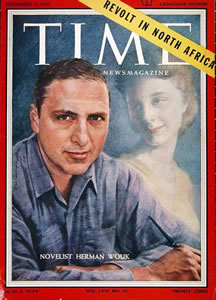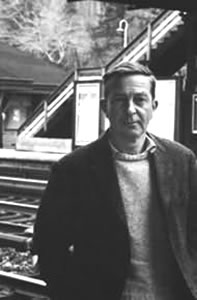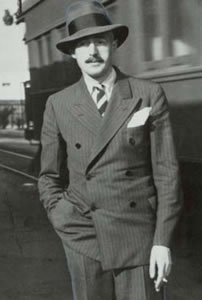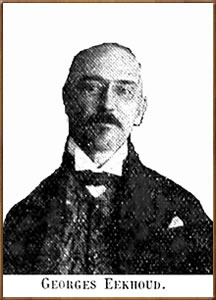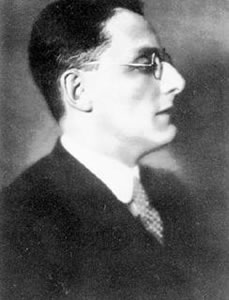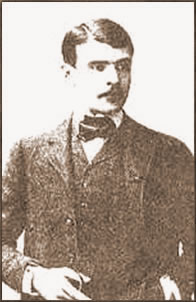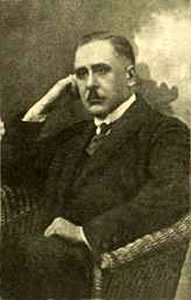De Franse schrijver Louis-Ferdinand Céline (pseudoniem van Louis Ferdinand Destouches) werd geboren in Courbevoie op 27 mei 1894. Zie ook alle tags voor Louis-Ferdinand Céline op dit blog.
Uit: Reis naar het einde van de nacht (Vertaald door E.Y. Kummer)
“Dat was het eind van deze dialoog, want ik herinner me goed dat hij nog net tijd had om te zeggen: ‘En ’t brood?’ En toen niets meer. Daarna, alleen maar een vlam, met lawaai erbij. Maar dan een lawaai zoals je nooit zou geloven dat het bestond. M’n ogen, oren, neus en mond waren opeens zo vol lawaai dat ik werkelijk dacht dat dit het eind betekende, dat ik zelf vuur en lawaai was geworden.
Maar nee, de vlam verdween, het lawaai bleef lang in m’n hoofd hangen, en m’n armen en benen beefden alsof iemand ze van achteren heen en weer schudde. ’t Leek of mijn ledematen ervandoor gingen, maar ze bleven toch bij me. In de rook, die nog lang daarna in m’n ogen prikte, bleef de scherpe geur van kruit en zwavel hangen, alsof men de luizen en vlooien van de hele wereld wilde verdelgen.
Onmiddellijk daarop dacht ik aan wachtmeester Barousse, die zo juist uit elkaar gespat was, zoals de andere knaap ons verteld had. Dat was goed nieuws. ‘Prachtig!’ dacht ik meteen. ‘Dat is een hele grote ploert minder in het regiment!’ Hij had me voor de krijgsraad willen slepen voor een blik conserven. ‘Ieder z’n privé-oorlogje!’ zei ik bij mezelf. Van die kant bekeken, scheen de oorlog zo nu en dan wel z’n nut te hebben, dat moest ik toegeven! Ik kende nog wel drie of vier rotschoften in het regiment die ik, net als Barousse, graag aan een granaat had geholpen. Wat de kolonel betrof, die wenste ik geen kwaad toe. Toch was hij ook dood. Ik zag hem eerst niet meer. Dat kwam omdat hij door de ontploffing op het talud was geslingerd, languit op z’n zij, in de armen van de cavalerist te voet, de boodschapper, die ook dood was. Ze omhelsden elkaar, die twee, nu en voor eeuwig, maar de cavalerist had geen hoofd meer, je zag alleen een opening boven in z’n hals, met bloed erin dat klokkend sudderde, zoals jam in een pan. De buik van de kolonel was opengereten, z’n gezicht was afschuwelijk vertrokken. ’t Had hem beslist pijn gedaan, toen het gebeurde. Z’n eigen schuld! Als hij bij de eerste kogels weg was gegaan, was hem dit niet overkomen.”
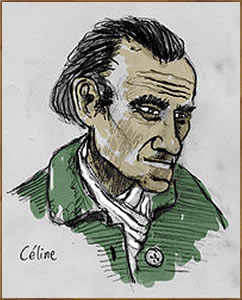
Louis-Ferdinand Céline (27 mei 1894 – 1 juli 1961)
De Nederlandse schrijver, journalist en columnist Jan Blokker werd geboren in Amsterdam op 27 mei 1927. Zie ook alle tags voor Jan Blokker op dit blog.
Uit: Serven aan de Schelde
‘Hollanders’, zegt Louis Seynaeve in Het verdriet van België tegen zijn vriendin, ‘Hollanders verstaan geen kloten, Constance. Zij interesseren zich helemaal niet aan België.’
Maar het land ligt wel bij ons om de hoek, ze spreken er voor de helft een taal die op de onze lijkt, ze hebben een federale minister-president die in vergelijking met Balkenende nog heel wat lijkt omdat hij in drie jaar nog pas twee kabinetten heeft verklungeld, maar daar staat tegenover dat hij in die tijd al drie keer naar z’n koning terug moest omdat hij geen formatie rondkreeg, en dat hij het verschil niet kent tussen de Brabançonne en de Marseillaise. In het 1-uur-nieuws van de VRT vroegen ze aan de voorzitster van de Vlaamse socialisten of de geboren christen-democraat Leterme nog kans zal zien om Leterme II een doorstart te bezorgen. De voorzitster lachte vriendelijk, en zei: ‘Ach, Leterme. Daar is geen depanneren aan.’
We kunnen veel herkennen, maar niettemin: geen belangstelling. Toen vorige week de Vlaamse liberalen onaangekondigd met hun regering braken, had ons Journaal daar een itempje van twintig seconden voor over, in sommige avondkranten was het nieuws als kortje op een economiepagina terechtgekomen, en de volgende ochtend las ik de column van iemand die toegaf dat hij niets van dat BHV-gedoe begreep, maar uit wiens toon je kon afleiden dat hij er eigenlijk heel trots op was dat die onzin hem boven de pet ging. Wel columns schrijven, maar te lui om het nieuws van de buren bij te houden.“

Jan Blokker (Amsterdam, 27 mei 1927)
Getekend door Peter van Straaten
De Nederlandse schrijver, journalist, blogger en gamedeskundige Niels ’t Hooft werd geboren in Leiderdorp op 27 mei 1980. Zie ook alle tags voor Niels ‘t Hooft op dit blog.
Uit: Toiletten
„Je zei: ‘Er zijn cafés in de straat, laten we daar eens naar toe gaan.’
Het was een onbekende buurt in een stad waar ik wel eens in winkels had geneusd. Mijn moeder op zoek naar mooie kleren die toch goedkoop zijn en ik naar plekken waar ze videogames verkopen.
We liepen langs spiegels, voorbij het grofvuil. We zagen de reflectie van onze eigen benen en dat was tof. Het kon zo in een videoclip. Ik keek om me heen en probeerde de indrukken zo goed mogelijk in me op te nemen en vast te leggen, als het beste fototoestel van Nederland.
Dit was het dan. Mijn nieuwe leven was begonnen.
Als ik mijn Game Boy bij me had gedragen, dan had ik hem nonchalant achter me gegooid, want ik had hem niet meer nodig. Ik zag het grijze ding kletteren: het Dit Matrix scherm schoot los, zoals het van ouderdom vanzelf losging, het ketste tegen de straat en vloog omhoog, de klep van de batterijen vloog eraf, en de batterijen zelf, die doken erachteraan. Ik sprong erop. Krak, net als Mario dat doet om met zijn opponenten af te rekenen. In een flits was de kapotte Game Boy een blauwe schildpad met stekels; ik stelde me voor hoe ik erop landde, hoe de stekels zich een weg baanden door mijn schoenzolen en hoe ik het leven liet. Je moet het een keer meegemaakt hebben voordat je ze de volgende keer kunt ontwijken. Je kunt dan rustig een andere strategie bedenken. Zo sterk zien die beesten er niet uit, er moet een manier zijn om met ze af te rekenen zonder stekels in je zolen te krijgen. Het denkbeeldig gebroken plastic liet ik achter me.
Ik probeerde je hand te pakken, maar dat stond je niet toe. Je vond dat stom, meer iets voor kinderen, of voor moeders met kinderen. Ik tuurde om me heen, hield onder mijn linkerarm een grote doos. Daar zat een Super Nintendo in. Die was anders dan de gameboy. Dierbaar, kostbaar, het nieuwste van het nieuwste o
f toch zeker pas drie jaar oud, iets om nog wat beter over na te denken voor ie zonder pardon in de goot werd geworpen of in de gracht, tussen de brokken piepschuim en de half gezonken boten.”
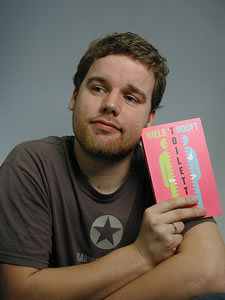
Niels ’t Hooft (Leiderdorp, 27 mei 1980)
De Estse schrijver Kaur Kender werd geboren op 27 mei 1971 in Estland. Zie ook alle tags voor Kaur Kender op dit blog.
Uit: Through Peaceful Eyes (Vertaald door Jurgen Kaljuvee)
„Every time you think of me the bells are singing somewhere. I am lying down, my body is in heat. Every part of me you touched hums. I am lying in the bed, the window is open, you are everywhere and you are getting increasingly closer to me. Your voice is sounding in the clatter of trams, in the rumble of the cars, your look is in the neon lights, in traffic lights, in street lights, your hair is waving in the trees, your pride is in the church towers and tall buildings. You are everywhere: your hurry is in the hourly radio news, people shaking in trolleys and trams feel your solitude, your tenderness and care is in the children marching across the street, your secrets are behind the dark windows of the the abnormally parked jeeps, your impatience is in the people waiting behind the traffic lights, your indifference is in the smiling tourists, your contempt is in the large street adverstisments. Your peace is in the morning mist and your search is in the car lights gleaming through the mist, your existence, your presence is in the parking tickets, your memories are in the Toompea viewing platforms, your past and the future are at this graveyard reachable by the noise of cars, and sometimes a thought about you rests there as well. All the flower shop vases are full of your smiles, every café is full of your leisurely moments, some have many, some very few. Your sudden appearance is in all the the ringing mobile phones, every plane taking flight is your desire to leave, each plane landing your delight of arrival, every passing train has an unused opportunity of yours, every train passing the bridge has your superstition and out there by the sea, there, on those rocks, at the sunset is your faith, your decision, your strength. Your love … Look at me through your peaceful eyes. Love is in your eyes.“

Kaur Kender (Estland, 27 mei 1971)
De Duits-Iraanse dichter en schrijver Said werd geboren op 27 mei 1947 in Teheran. Zie ook alle tags voor Said op dit blog.
Für mich
riechen deine Hände nach Muskat
und Kindertagen.
Für mich
ist dein Mund ein sanftes Ufer,
nahgespült und unbewacht.
Für mich
hat sich das Blau deiner Augen
zurückgezogen zu meinen Schiffen.
Wir schlafen auf dem Flußbrett.
Fische von damals kommen
und küssen uns die Zehen.
Die Farbe der Liebe ist blau,
ich weiß.
Nur,
daß diese Erde –
genarbt von unseren Küssen –
mit ihren gebrochenen Farben
auf uns lastet.
Der Fesselballon
trägt die Wurzeln in der Hosentasche.
Ich habe dich
mit einer Wolke verwechselt.
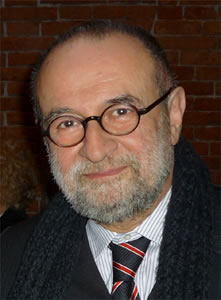
Said (Teheran, 27 mei 1947) (Teheran, 27 mei 1947)
De Nederlandse journalist, schrijver en kunsthandelaar Adriaan Harrie Venema werd geboren in Heiloo op 27 mei 1941. Zie ook alle tags voor Adriaan Venema op dit blog.
Uit: Schrijvers, uitgevers en hun collaboratie. Deel 3B S. Vestdijk
„Overigens had Vestdijk op 5 september al in Het Parool een artikel gepubliceerd, getiteld ‘Wel Duitsch op school’. Vestdijk nam hierin duidelijk stelling tegen hen die vonden dat het Duits als leervak op middelbare scholen niet gehandhaafd moest worden. Vrij Nederland behoorde tot de tegenstanders van het Duits als leervak. Het blad poneerde een mening die niet was mis te verstaan: ‘Afschaffing van het Duitsch als leervak is een waardig, scherp en blijvend protest van het geheele Nederlandsche volk tegen de gebeurtenissen van 10 Mei 1940 tot 7 Mei 1945. Afschaffing van het Duitsch als leervak ontlast het overladen onderwijsprogramma en maakt tijd vrij, veel beter te besteden aan andere vakken als Nederlandsch, vaderlandsche geschiedenis, Engelsch en Fransch. Door afschaffing van het Duitsch als leervak beschermt het Nederlandsche volk zich tegen een naburigen haard van geestelijke besmetting, welks gevaarlijkheid nog vergroot wordt door de nauwe verwantschap van beide talen en door de geestesgesteldheid van zeer velen, wier moedertaal het Duitsch is.
Handhaving van het verplichte onderwijs in het Duitsch beteekent ernstige en onnodige verzwakking van de positie der Nederlandsche beschaving, dus van Nederland, tegenover een gevaarlijken buur.’
We kunnen ons de geestelijke benauwenis die in de eerste naoorlogse jaren heerste en die mensen tot dit soort opinies bracht nauwelijks meer voorstellen. De afschaffing van het Duits als leervak, alleen omdat de nationaal-socialisten deze taal spraken en schreven, is al even benepen als, bijvoorbeeld, het taboe dat in het hedendaagse Israël rust op de muziek van Wagner, enkel en alleen omdat de nationaal-socialisten in die muziek, die ze zonder twijfel niet begrepen, wat van hun waanideeën terugvonden.
Vestdijk intussen had van een dergelijke benepenheid geen last. Hij was vóór het leervak Duits. ‘Men las wel eens, dat het hier ging om een “waardig protest” tegen… ja, tegen wien of wat eigenlijk?’ schreef hij. ‘Tegen Duitschland? Nederland heeft vijf jaar lang met voldoende waardigheid tegen de Duitsche overheersching geprotesteerd om dit eenigszins holle gebaar er niet aan toe te voegen. Men krijgt trouwens den indruk dat hier minder de behoefte aan “protest” in het spel is dan wel de zucht naar wraak.’
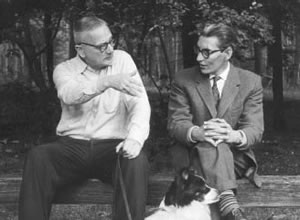
Adriaan Venema (27 mei 1941 – 31 oktober 1993)
Vestdijk en zijn biograaf Nol Gregoor
De Amerikaanse schrijver John Barth werd geboren op 27 mei 1930 in Cambridge, Maryland. Zie ook alle tags voor John Barth op dit blog.
Uit: Coming Soon!!!
„Call me ditsy, call me whatchadurn please; just an old-fart Chesapeake progger’s what I am, with more orneriness than good sense — else I wouldn’t be sitting here a-hunting and a-pecking on “Big Bitsy’s” ergonomic keyboard whilst the black wind roars and the black water rises and the power flickers and the cabin shakes. I’d’ve hauled my bony butt across Backwater Strait to high ground over in Crassfield whilst the hauling was still doable, before the storm-surge from Zulu Two (stay tuned) puts Hick Fen Island* eight fingerforking feet under Backwater Sound.
“Whoa ho there, Dits,” my mind’s ear hears the gentle reader gently interpose: “Where’s Hick Fen I.? Where’re Backwater Sound and ditto Strait and mainland Crassfield? Who’s Zulu Two, and whaddafug’s a progger, and who’s thissere EARL character, that you haven’t even mentioned yet?”
All in good time, mon semblable et cet, which Yrs Truly don’t happen to have a whole skif?oad of just now. Anyhow, old Ditsy-Belle’s a gal that likes her stories straight up, if you read me: Get things going, says I, then cut to the chase, or old Dits’ll chase to the cut. Once upon a time’s about as far as we’ll go in the way of wind-up for your pitch. You say It was a dark and stormy night? We copy, mate: now on with the story, ess vee pee.
Ditsy-Belle, Ditsy-Boy: I’ve done time in my time as mainly male and ditto feem; have attained the age where what’s between my legs matters less to either of us than what’s between my ears or just twixt you and me. Which is to say, a certain high-density disk-in-the-hand that I progged from the bush this morning after Zulu One (a dark and stormy night forsooth) in the westmost marshes of B.E.W.A.R.(E.), the Backwater Estuarine Wetlands Area Reserve (East): a double-sided disk triple-zipped in a ZiplocTM baggie inside another inside another and hence bone-dry enough, as bones go hereabouts, that I could read its blot-free label through all three bags in the mucky marshgut whither it’d wended from wherethefuckever.“
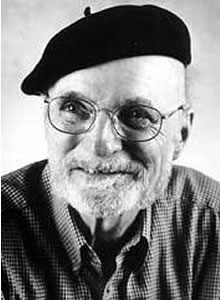
John Barth (Cambridge, 27 mei 1930)
Zie voor nog meer schrijvers van de 27e mei ook mijn vorige blog van vandaag.

